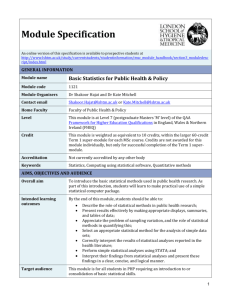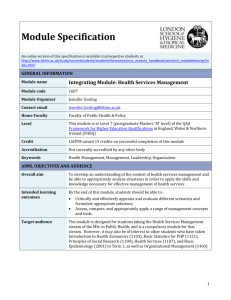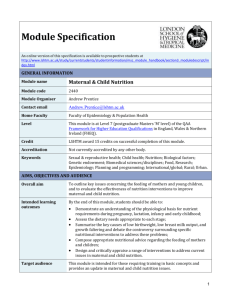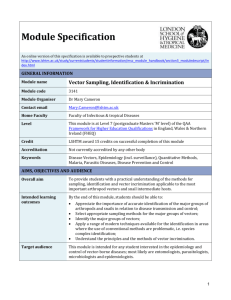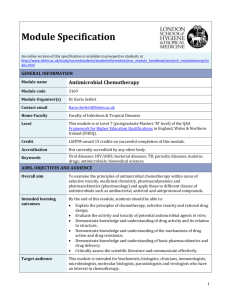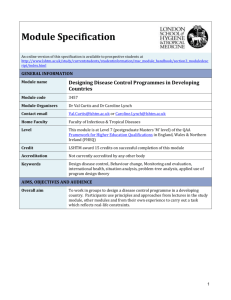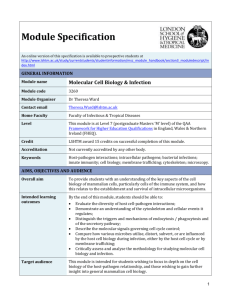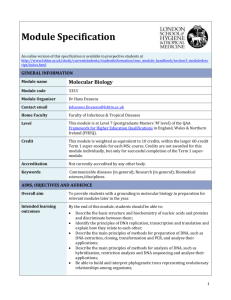2459 Current Issues in Safe Motherhood Module Specification
advertisement
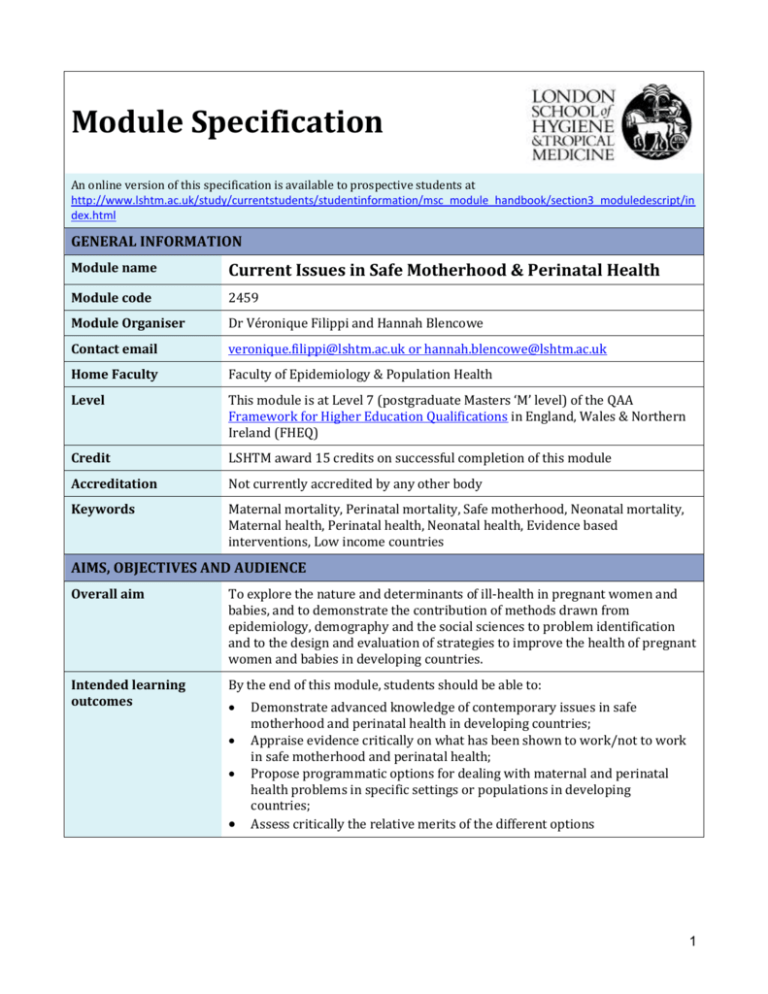
Module Specification An online version of this specification is available to prospective students at http://www.lshtm.ac.uk/study/currentstudents/studentinformation/msc_module_handbook/section3_moduledescript/in dex.html GENERAL INFORMATION Module name Current Issues in Safe Motherhood & Perinatal Health Module code 2459 Module Organiser Dr Véronique Filippi and Hannah Blencowe Contact email veronique.filippi@lshtm.ac.uk or hannah.blencowe@lshtm.ac.uk Home Faculty Faculty of Epidemiology & Population Health Level This module is at Level 7 (postgraduate Masters ‘M’ level) of the QAA Framework for Higher Education Qualifications in England, Wales & Northern Ireland (FHEQ) Credit LSHTM award 15 credits on successful completion of this module Accreditation Not currently accredited by any other body Keywords Maternal mortality, Perinatal mortality, Safe motherhood, Neonatal mortality, Maternal health, Perinatal health, Neonatal health, Evidence based interventions, Low income countries AIMS, OBJECTIVES AND AUDIENCE Overall aim To explore the nature and determinants of ill-health in pregnant women and babies, and to demonstrate the contribution of methods drawn from epidemiology, demography and the social sciences to problem identification and to the design and evaluation of strategies to improve the health of pregnant women and babies in developing countries. Intended learning outcomes By the end of this module, students should be able to: Demonstrate advanced knowledge of contemporary issues in safe motherhood and perinatal health in developing countries; Appraise evidence critically on what has been shown to work/not to work in safe motherhood and perinatal health; Propose programmatic options for dealing with maternal and perinatal health problems in specific settings or populations in developing countries; Assess critically the relative merits of the different options 1 Target audience This module is open to anyone with an interest in the public health problems of pregnant women and babies in developing countries CONTENT Session content The module is expected to include sessions addressing the following topics (though please note that these may be subject to change): The public health problems facing pregnant women and babies and the complex of factors which contribute to these problems. Indicators of levels of maternal and perinatal health, methods of measurement and sources of information. Methods and techniques from different disciplines which can contribute to the study of the Health problems of pregnant women and babies. Current strategies for the improvement of maternal and perinatal health. Links between the health of women and babies TEACHING, LEARNING AND ASSESSMENT Study resources provided or required References lists are provided for students who wish to get deeper into issues raised during classes. Course organisers also provide free materials, such as Lancet series, when these are available and suitable. Teaching and learning methods This module starts with lectures in weeks 1 and 2, organised around broad themes, to cover common ground. It moves to a problem-based approach in weeks 3, 4 and 5. At the beginning of week 3, participants are offered a choice of a problem topic to work on. Participants are then divided into groups of about 6-7 members and spend the remainder of the module working as a group on their particular problem. Each group is allocated a staff facilitator who is available for consultation. During the last week of the module each group makes a presentation of their findings to the rest of the class. Assessment details Participants are assessed on the basis of their group's poster presentation during the final week of the module and of an individual mark for a short scientific editorial for a medical journal (no more than 600 words). The individual assessments contribute 60% and group assessments 40% of the final mark For students who are required to re-sit, or granted a deferral or new attempt, the task will be to write a scientific editorial on a paper suggested by Module Organiser. Assessment dates Assessments will take place or be due during the last two days of the module. For students who are required to re-sit, or who are granted a deferral or new attempt, the next assessment deadline will be the standard Schoolrecommended date in mid/late September 2016. Language of study and assessment English (please see ‘English language requirements’ below regarding the standard required for entry). 2 TIMING AND MODE OF STUDY Duration The module runs for 5 weeks at 2.5 days per week; this module runs between Monday morning and Wednesday lunchtime Dates For 2015-16, the module will start on Monday 22 February 2016 and finish on Wednesday 23 March 2016. Timetable slot The module runs in LSHTM timetable slot D1 Mode of Study The module is taught face-to-face in London. Both full-time and part-time students follow the same schedule. For full-time students, other LSHTM modules are available in the other half of the week for the C and D slots. Learning time The notional learning time for the module totals 150 hours, consisting of: Contact time ≈ 40 hours Directed self-study ≈ 40 hours Self-directed learning ≈ 20 hours Assessment, review and revision ≈ 50 hours APPLICATION, ADMISSION AND FEES Pre-requisites There are no specific prerequisites for this module English language requirements A strong command of the English language is necessary to benefit from studying the module. Applicants whose first language is not English or whose prior university studies have not been conducted wholly in English must fulfil LSHTM’s English language requirements, with an acceptable score in an approved test taken in the two years prior to entry. Applicants may be asked to take a test even if the standard conditions have been met. Student numbers Student numbers are typically 35 per year; numbers may be capped due to limitations in facilities or staffing. Student selection Preference will be given to LSHTM MSc students and LSHTM research degree students. Other applicants meeting the entry criteria will usually be offered a place in the order applications are received, until any cap on numbers is reached. Applicants may be placed on a waiting list and given priority the next time the module is run. Full Registration (full participation) by LSHTM research degree students is required for this module. Fees For registered LSHTM MSc students, fees for the module are included within MSc fees (given on individual course prospectus pages). If registering specifically for this module, as a stand-alone short course, individual module fees will apply. Tuition fees must be paid in full before commencing the module, or by any fee deadline set by the Registry. Scholarships Scholarships are not available for individual modules. Some potential sources of funding are detailed on the LSHTM website. 3 Admission deadlines For 2015-16: For registered LSHTM MSc students, the module choice deadline (for Term 2 and 3 modules) is Friday 20 November 2015. If registering specifically for this module, applications may be made at any time but, as places are limited, applications ahead of the MSc deadline are strongly advised. All applications should be submitted at the latest 8 weeks prior to the start of the module. Formal registration will take place on the morning of the first day of the module. ABOUT THIS DOCUMENT This module specification applies for the academic year 2015-16 Last revised 11 July 2013 by Véronique Filippi; Minor amendments SDB 20th July 15 London School of Hygiene & Tropical Medicine, Keppel St., London WC1E 7HT. www.lshtm.ac.uk 4

